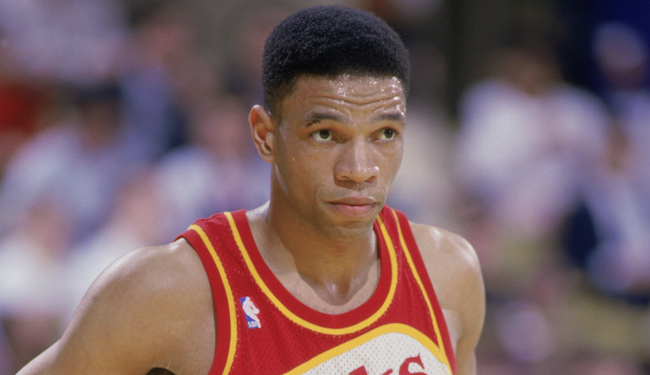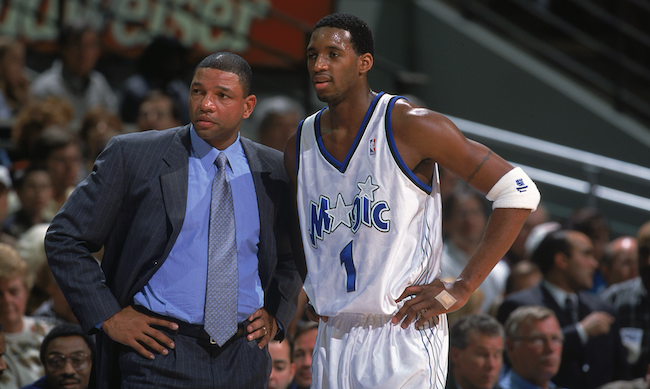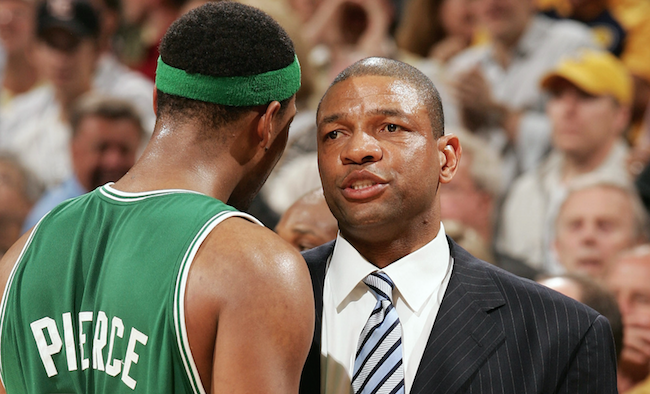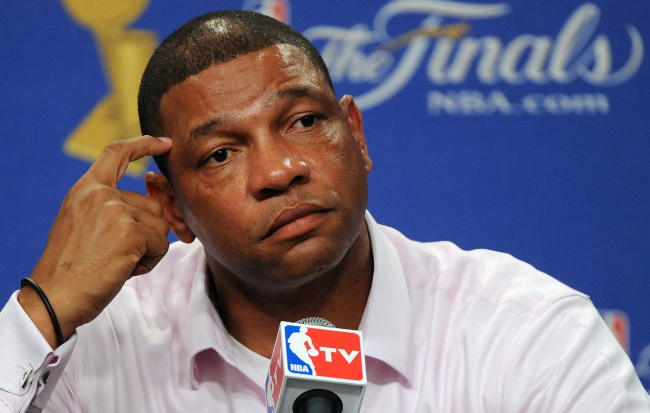
Doc Rivers has enjoyed many NBA lives.
The Marquette product first cut his professional basketball teeth as a defensive-oriented swingman with the Atlanta Hawks in the 1980s, but his playing days are most remembered for time spent as a reserve for the New York Knicks. Rivers’ coaching career began just three years after his retirement as a player when he began roaming the sidelines for the Orlando Magic in 1999-00.
He never took Tracy McGrady’s undermanned Orlando squads any farther than the first round, despite making the playoffs in three of his four years as coach, and was ultimately fired after the Magic’s dismal start to 2003-04. After less than a full season in the broadcasting booth for NBA on ABC, Rivers was hired as coach of the Boston Celtics in April 2004.
But the Rivers we know now, a man universally considered as one of the best coaches in basketball, didn’t emerge until the Celtics swung for the fences a few years later by trading for Ray Allen and Kevin Garnett. Up to that point, in fact, he was a divisive figure among Celtics fans, a coach who had no previous ties to the organization and had yet to make up for it with on-court success the likes of which Boston was accustomed.

And as Rivers explained in a sprawling interview with Sports Illustrated‘s Justin Barrasso, the Celtics’ famed Big Three almost never came to fruition – a depressing possibility due to early friction between he and incumbent star Paul Pierce.
“Me and Paul butted heads a ton during my first year there,” admitted Rivers. “Late in the [2004–05] season, I spoke to him in front of the team in the locker room. I said to Paul, ‘I’m not changing on my beliefs in the way I think you should play. I’m not changing. So one of two things is going to happen—I’m going to get fired, or you’re going to change, because I’m not changing.”
Rivers and Pierce eventually mended fences, of course, winning Boston’s lone championship over the last 30 years in 2008, before teaming up for a second time when the 37-year-old free agent decided to sign with the Los Angeles Clippers this summer.
As both coach and team president in Los Angeles, Rivers has never wielded more power than he does today. But speaking with SI from the Celtics’ TD Garden at an event for his local charity benefiting inner-city youth, he made clear that he’ll always bleed green and gold more than any other color.
“I never left this community,” said Rivers. “Just because I moved didn’t mean I was going to give up on this charity. Boston is going to be a part of me for the rest of my life. My kids identify as Celtics, and my wife does, too. That’s who we are. I was here for nine years and I made a lot of special relationships and I wanted to get involved. We did a couple smaller events in the beginning, and then we came up with ‘Hoop Dreams.'”
And why not? No matter where Rivers, somehow only 53 years old, goes in his coaching career, his memories with the Celtics will be tough to duplicate. The “Ubuntu” magic that spurred them to a title in 2008 persisted even after Garnett was lost early the following season with a leg injury, one that his coach insists doomed Boston from the chance for multiple titles. “He was never the same,” Rivers told Sports Illustrated. “We could have had a real run, and that was taken away.”

But hope was still alive for the Celtics even with a depleted Garnett one year later. As Rivers watched his team relatively struggle – it was No. 3 in the East at the time – through the regular season grind, he famously came up with a unique motivational tactic after a February win over the contending Los Angeles Lakers at Staples Center, one that ultimately proved prophetic.
“I actually thought we were losing hope,” said Rivers. “So this was one of those things that wasn’t pre-planned, it was instinctive.”
In an effort to motivate his players to return to the Staples Center, Rivers decided he would take $100 from each player and hide the money in the visitor’s locker room.
“It was just a gut move,” said Rivers. “I thought the Lakers would be in the NBA Finals, and the only way to play them again was to get there with them.”
“I started asking for money from all the players,” explained Rivers. “Getting money from Kevin Garnett was like pulling a tooth. I said, ‘Just give me a hundred dollars! That’s all I want!’ Then finally I told him what I was doing, and Kevin wanted to pay for everyone, saying, ‘I’ll pay for him, I’ll pay for him, I’ll pay for him.’… When we played the first game of the Finals there, the players got off the bus and went straight in the locker room. We were lucky that it was there.
Boston, of course, faced off against Los Angeles in a rematch of the 2008 NBA Finals. And if not for a string of misfortune late in the series that began with Kendrick Perkins’ ACL tear in Game 6, Rivers still believes the Celtics would have won another championship.

In fact, the 2000 Coach of the Year says he thinks about Boston’s Game 7 loss to the Lakers more than he does the title they won two years earlier.
“I think of the Game 7 loss far more than I think of when we won the championship,” explained Rivers. “I think about it a lot, especially whenever I’m around those guys. My mom passed away, and [Rajon] Rondo came to the funeral. And we’re sitting there, and Game 7 popped up. We didn’t even mention [winning the 2008 championship]. Paul and I talk about it, Thibs [Tom Thibodeau] and I talk about it probably more than anyone because I talk with him the most. We’re perfectionists, and that loss still stings.”
Pierce was the 2008 Finals MVP. Allen was the crunch-time assassin. And the emergence of Rajon Rondo kept Bostons championship window open longer than anyone anticipated. But it was Garnett who was Boston’s heartbeat – not just the driving force behind its dominant defense, but ballyhooed team-first mentality, too.
Whether or not Rivers’ account of the lithe big man facing off against Glen Davis in an arm-wrestling contest – after “Big Baby” had already taken down each of his teammates – is a good example of that last aspect isn’t for outsiders to decide. Regardless, it’s one he’ll clearly never forget.
“I thought someone was going to get hurt,” said Rivers. “The whole team was in the back of the plane, and I thought Kevin was going to get hurt. ‘Big Baby’ is huge, and he weighs a hundred more pounds than Kevin. He ran through everyone else in a second, just bam, bam. I knew Kevin would try to win, and I remember telling the coaches, ‘I don’t like this at all.’ I kept saying to the team, ‘Hey guys, let’s be careful here.’
“If I could get anything on camera, this would be it. It was the most amazing display of will power and mind power. Kevin stared him in the eye and looked at him. He wouldn’t stop. You could see ‘Baby’ go from wanting to win to literally seeing him break down mentally. Kevin made Baby give in. Kevin was just staring at him, saying ‘I’m not moving. You’re not going to move me.’ Then bam, Kevin won.”
Stories like that one are just one of countless reasons why Rivers had so much trouble deciding whether or not he wanted to leave the Celtics after 2012-13. With Allen long gone and Garnett and Pierce soon to follow, however, his roots to Boston had never been weaker – and the Clippers were offering him an exciting opportunity to be the chief personnel decision-maker of an established championship contender, too.
Some, though, will always identify Rivers with modern era Celtic pride. This emotional scene during the waning moments of a Game 7 loss to the Miami Heat in the 2013 Conference Semifinals, when the futures of Boston’s coach and star players were very much in doubt, is indicative of just how indelible a mark Rivers made on the Celtics.
Though part of his heart remains in Boston, Rivers’ mind is now squarely in Los Angeles.
Many have lamented DeAndre Jordan’s shocking decision to renege on his commitment to the Dallas Mavericks and ultimately re-up with the Clippers. That sudden change of heart not only compromised the Mavericks’ future during Dirk Nowitzki’s twilight, but also rendered their other free agency choices less than optimal – from team and individual perspectives.
Rivers isn’t crying for Dallas, though. He even insists that Mark Cuban’s cries of misconduct and outright disrespect from Jordan and Los Angeles’ camp are wildly out of touch, and a complete misinterpretation of how summer business is done in the NBA.
“I kept hearing all summer, ‘Mark Cuban doesn’t like you,’” said Rivers. “I could care less about that. My only care is about DJ, and he’s a good kid. After all the complaints afterward, it was the same thing with me. DJ didn’t call me when he [verbally committed with Dallas], his agent called me. That’s the way the business works. He would have called me eventually. It was the same way when Ray [Allen] left the Celtics. Ray’s agent called me.
“Cuban said he deserved a call, but he didn’t deserve a call or an apology. He doesn’t deserve either one. It’s funny how much I hear, ‘Boy, Mark Cuban is mad at you.’ Listen, my job isn’t to make Mark Cuban happy. My job is to make him miserable. This is why it’s a competition.
Had the Clippers managed to finish off the Houston Rockets after taking a 3-1 lead in the Conference Semifinals, the league’s most infamous emoji war may never have taken place at all. Winning has a way of curing ills, and Los Angeles had the necessary blend of talent and experience to put a scare in the eventual champion Golden State Warriors at the very least – if not take them down altogether.
Even more than heartbreak and desire gleaned from the loss to Houston, Rivers thinks the Clippers’ epic first-round triumph over the San Antonio Spurs is what could propel them to heights the franchise has never seen. “If we do win the championship this year,” Rivers says, “it will be because of that series.”
But it might be because of an offseason influx of talent that may finally win Rivers the general manager some much-needed praise, too. In addition to luring Pierce back to Southern California, Los Angeles signed Josh Smith for the veteran’s minimum, added Wes Johnson in free agency, and took a flier on the inconsistent but undeniably gifted Lance Stephenson by surrendering seldom-used big man Spencer Hawes in a trade.
The Clippers suddenly boast the depth that’s been their biggest undoing for so many years, including last May for that historic collapse against the Rockets. With top-tier talents like Chris Paul, Blake Griffin, and Jordan still captaining the ship, Los Angeles has more legitimate hope for a championship than ever before.
Still, it’s never just about skill in basketball. It’s a team game, and the colossal importance of on- and off-court chemistry is certainly not lost on Rivers – he’s a Garnett-era Celtic, after all. Los Angeles has almost unparalleled talent, but it also has the out-sized personalities to match. Will so many egos be able to peacefully coexist in the Staples Center locker room?
“We have to get along,” said Rivers. “I’m not talking about the whole DJ-Chris thing, which was overblown, but we have to get along as a group. We have a lot of personalities on our team, starting with me as a coach right down to Paul and Lance. Collectively, individually, we’re as good as anybody, but we haven’t proven that we can function as a team. If we do that, we’re going to be hard to beat. So our goal is for people to sacrifice. If we do it right it, I think we’re going to special, and I can’t wait to get started.”
And we can’t wait to watch Rivers take the next step in his imminently legendary career, no matter where it may go.
[Via Sports Illustrated, via NBA]






